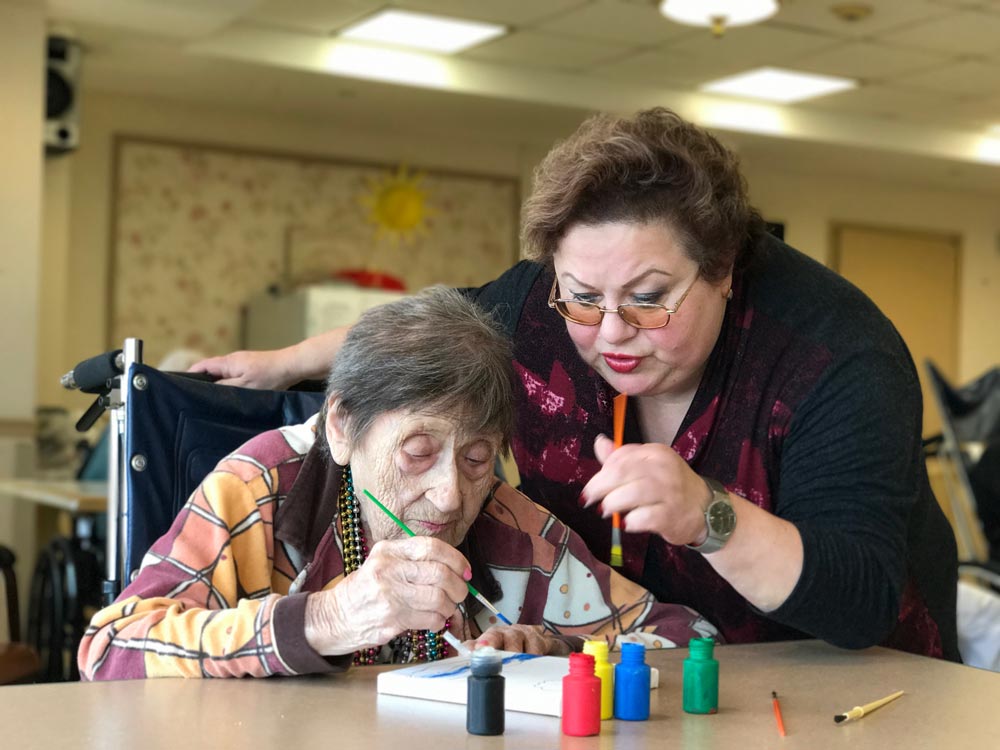Leading Memory Care Facilities Charlotte: Making Certain Convenience and Security for Seniors
Leading Memory Care Facilities Charlotte: Making Certain Convenience and Security for Seniors
Blog Article
Reliable Dementia Care Strategies for a Better High Quality of Life
In the world of mental deterioration care, the application of effective methods is essential for enhancing the quality of life for both individuals influenced by the disease and their caregivers. Understanding the unique stages of dementia allows for customized treatments that attend to the evolving needs of clients-- from promoting cognitive involvement in the early stages to making certain self-respect in late-stage care.
Understanding Dementia Stages

In the very early stage, individuals may experience moderate memory loss and trouble with familiar jobs. Treatment techniques should concentrate on maintaining self-reliance and offering cognitive stimulation. In the late stage, people might lose the capacity to call for and connect assistance with everyday tasks.
Recognizing these phases allows caretakers to adapt their approaches and provide assistance that aligns with the person's current needs, inevitably facilitating far better monitoring of the condition and enhancing the overall caregiving experience. Recognizing dementia phases is consequently a foundational facet of reliable mental deterioration care.
Communication Methods
Effective communication is an important component of dementia treatment, specifically as the condition proceeds with its different stages. As cognitive capabilities decline, it comes to be important to adjust interaction techniques to meet the demands of individuals with mental deterioration. Making use of clear, easy language is vital; caregivers need to avoid complex sentences and lingo, choosing instead for simple, succinct expressions.
Non-verbal communication plays a just as substantial role. Faces, gestures, and tone of voice can communicate heat and understanding, commonly enhancing spoken messages. Keeping eye contact and an open position promotes a feeling of link and safety and security, urging individuals with mental deterioration to engage even more completely in discussions.
It is also beneficial to hold your horses and allow ample time for responses. Individuals might call for added time to procedure details and formulate their ideas. If comprehension appears lacking., duplicating or rewording questions might be essential.
Lastly, focusing on the person's interests and individual background can promote extra purposeful communications. Taking part in acquainted subjects can stimulate favorable memories and emotions, even more enhancing the interaction experience (memory care facility charlotte). By using these methods, caregivers can dramatically boost the top quality of communications, advertising dignity and respect for people coping with mental deterioration
Creating a Safe Atmosphere
Developing a secure setting for individuals with mental deterioration is important to promoting their wellness and freedom. A properly designed area can substantially reduce the risks of mishaps and improve the top quality of life for those influenced by this condition.
Lights plays a vital function as well; utilizing all-natural light wherever feasible and incorporating evening lights can assist people navigate their surroundings securely. Furthermore, labeling rooms and important items can help memory and positioning, minimizing complication and stress and anxiety.
It is additionally essential to develop an acquainted atmosphere by customizing the space with pictures or valued items, which can stimulate positive memories and a sense of belonging.
Integrating furniture that is both functional and comfortable adds to a helpful atmosphere, permitting individuals to participate in day-to-day tasks with ease. Inevitably, a secure setting not only safeguards against physical risks however additionally fosters a complacency, which is necessary for the emotional health of those coping with mental deterioration.
Involving Tasks and Routines
Engaging activities and structured routines are important parts in the care of individuals with mental deterioration, as they advertise cognitive function, psychological stability, and social communication. These activities ought to be tailored to the person's passions, abilities, and stage of cognitive decrease. memory care charlotte. Easy, repeated tasks such as gardening, arts and crafts, or food preparation can provide significant interaction, permitting individuals to use their skills while promoting a feeling of success
Developing a daily routine assists create a predictable setting, which can reduce anxiousness and complication. This structure can consist of assigned times for dishes, tasks, and rest, ensuring a balanced technique to life. Including social communications right into these regimens, such as group tasks or seeing family members, additional boosts emotional well-being and combats feelings of isolation.
Additionally, exercises, such as strolling or dancing, not only promote physical health but also stimulate psychological engagement. Motivating engagement in neighborhood occasions or assistance groups can give additional opportunities for socialization. On the whole, the assimilation of appealing activities and organized regimens the original source is important in improving the lifestyle for people with mental deterioration, fostering independence and dignity while addressing their special requirements.
Sustaining Caretaker Well-Being
Taking care of individuals with mental deterioration can be a demanding and psychologically taxing experience, making it essential to focus on the wellness of caregivers. Caregivers frequently face high levels of anxiety, anxiousness, and physical fatigue, which can lead to exhaustion otherwise resolved properly. To support their health, it is necessary to carry out a diverse approach.
First, supplying caregivers with access to education and learning and sources can encourage them with strategies to manage everyday difficulties. Support system, both in-person and online, supply a platform for sharing experiences, fostering a sense of neighborhood, and lowering sensations of isolation. In addition, respite care services allow caretakers to take necessary breaks, permitting them time to charge and attend to their own health and wellness requirements.
In addition, motivating caregivers to participate in self-care techniques-- such as regular exercise, healthy and balanced eating, and mindfulness-- can dramatically boost their durability. Advertising open communication concerning their feelings and difficulties with family members or specialists additionally aids reduce psychological burdens.
Final Thought
In final thought, efficient mental deterioration treatment approaches incorporate a detailed understanding of the disease's stages, the application of clear communication strategies, the facility of a secure atmosphere, and the promo of engaging activities and structured regimens. Additionally, focusing on the wellness of caregivers is vital to maintaining high quality care. By integrating these methods, the total lifestyle for individuals with dementia can be substantially enhanced, cultivating a supportive ambience that promotes self-respect and psychological wellness.
In the world of mental deterioration treatment, the execution of reliable approaches is important for improving the quality of life for both people affected by the condition and their caretakers. By employing these techniques, caregivers can substantially boost the top quality of communications, advertising self-respect and regard for individuals living with dementia.

Caring for individuals with mental deterioration can be a demanding and emotionally tiring experience, making it find out here now vital to focus on the health of caregivers.
Report this page